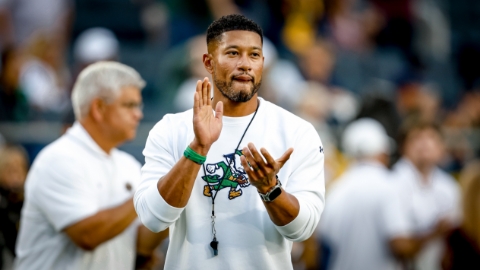
It’s the type of split personality that surely would be appealing to Robert Louis Stevenson, he of “The Strange Case of Dr. Jekyll and Mr. Hyde” fame.
Notre Dame’s offense boasts undeniable lightning-strike scoring abilities; the Fighting Irish command 13 scoring drives of four plays or less through the season’s first six games.
Likewise, they can be more thunder-like as situations require, rolling along through an opposing defense on, say, a 14-play, 75-yard drive that salts away a foe as done against Southern Cal.
Turns out, Notre Dame also possesses 13 scoring drives of nine or more plays --- showcasing an elite level of sustaining execution. It likely will need a similar blend Saturday against No. 19 Michigan (5-2) inside Michigan Stadium (7:30 p.m., ABC).
“I think it’s very valuable,” senior wideout Chris Finke said. “Usually, we try to start fast. If we get the ball first in the game, we want to hit them and score as quickly as possible.
“Like you said against USC, we really needed to have a long drive there the way that game was going. The fact we’re able to have a drive like that and cap it off with a score, I think was key to our success in that game.”
The enduring drive against the Trojans, keeping No. 7 Notre Dame (5-1) a one-loss team and in contention for the College Football Playoff, encapsulates the Irish’s ability to rely on its massive offensive line and primarily the legs of senior tailback Tony Jones Jr. Twelve of the 14 snaps on that game-securing drive came with runs from Jones Jr., Ian Book and Jahmir Smith.
“Then on long drives, when it’s important, just knowing that this team is never going to give up,” Book said. “That USC drive, there was no doubt in my mind, just looking everyone in the eyes, that we knew we had to score to win that game.
“No matter how many plays it was going to take, we were going to do whatever it was going to take.”
What might be frustrating opposing defenses is rather satisfying for Notre Dame’s defenders when the offense is methodically chewing through an opponent.
“It’s pretty great when you’re resting on the sideline,” said senior end Adetokunbo Ogundeji, a West Bloomfield, Mich., native. “You get your energy back up.”
Still, the Irish’s offense can get going before a team can even determine its energy level. Short fields, long fields, doesn’t matter when Book’s guiding Notre Dame in synchronicity. Of the Irish’s 13 scoring drives of four or fewer plays, nine of those marches cover 50 or more yards.
Conversely, the Wolverines’ No. 21-ranked scoring defense is allowing just 19 points per game; opponents have just five scoring drives of 60 or more yards in Michigan’s five wins. In two losses, the Wolverines’ defense gave up seven scoring drives of 60-plus yards to Wisconsin and Penn State.
“Our tempo, I think, is a big factor for that,” said Book, who’s trying to improve to 8-2 as a starter in games away from Notre Dame Stadium. “When we get into a rhythm, it’s pretty obvious to see how we can move down the field with different shots and different runs.
“We always talk about that a lot with (Offensive Coordinator Chip) Long, getting into a kind of a rhythm with him and with me understanding what he’s going to call next. When we get into a rhythm, we can fly up and down the field. So I would say that’s probably the biggest key to being able to have those quick drives.”
Book acknowledges that kind of offensive diversity could be maddening for the opposition.
“I imagine pretty frustrating,” Book said. “Obviously, those long plays can make the defense tired, and that’s what I think about with our defense when they stay out there for a long time. We can’t thank them enough for staying out there and keeping points off the board.
“So I imagine when we’re on offense and we’re doing the same thing, it’s tough. That’s a lot of plays, lot of guys are going to get tired.”

